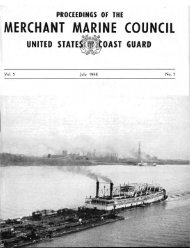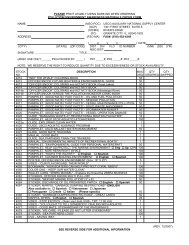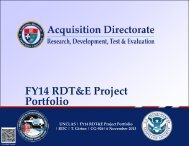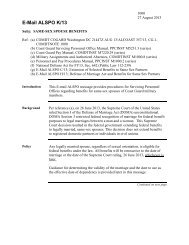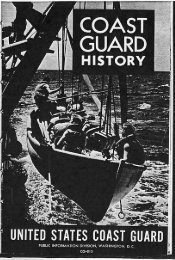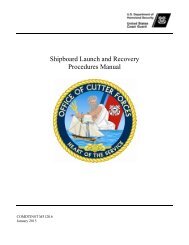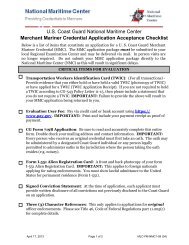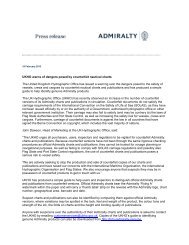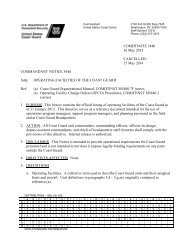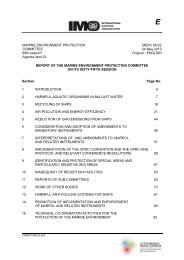Naval Operations Concept - Defense Technical Information Center
Naval Operations Concept - Defense Technical Information Center
Naval Operations Concept - Defense Technical Information Center
Create successful ePaper yourself
Turn your PDF publications into a flip-book with our unique Google optimized e-Paper software.
emphasize non-kinetic and “prior to launch” solutions that defeat the<br />
ballistic missile threat.<br />
Today, the robust air and missile defense capability of cruisers and<br />
destroyers is leveraged for maritime BMD. With the proper combat<br />
system upgrades, they will be able to focus sensors hundreds of miles<br />
over land to persistently monitor the airspace above a launch site.<br />
If a missile launch is detected, these ships can cue either sea-based or<br />
ground-based interceptors with accurate tracking and targeting data, and<br />
if equipped with advanced surface-to-air missiles, autonomously intercept<br />
incoming missiles.<br />
Surface combatants operating in international waters have great flexibility<br />
and can reposition in order to improve detection and interception. Ships<br />
conducting sea-based missile defense are sometimes tethered to a nominal<br />
station, which could leave them less capable of other missions such as<br />
undersea warfare or strike. As a result, single-mission land systems are<br />
a more operationally and financially efficient method to address a fixed,<br />
known threat than equivalently capable multi-mission surface combatants.<br />
As the ballistic missile threat continues to grow across the globe,<br />
the Navy’s maritime BMD capabilities may be called upon to respond<br />
in all theaters. When expanded through the employment of linked<br />
maritime operations centers (MOCs), sea- and land-based ballistic missile<br />
defenses can be integrated into a globally deployable capability, scalable<br />
and responsive to the threat.<br />
Preventive Deterrence through Partnership<br />
Effective theater security cooperation (TSC) and similar “soft power”<br />
activities promote a collective approach to mutual defense concerns while<br />
also addressing the conditions that result in conflict, thereby generating<br />
non-traditional deterrent effects. In this expanded deterrence framework<br />
partnership, cooperation and engagement strengthen relationships and<br />
extend overall capacities to stabilize and secure the maritime commons,<br />
creating effective and enduring disincentives to negative behavior. With<br />
maritime safety and security as a foundation for cooperation, global maritime<br />
partnerships enhance regional, transnational, and global security<br />
while also eroding support for disruptive extremist ideologies. Building<br />
partner capacity empowers like-minded maritime nations to address local<br />
and regional security issues and deter adversaries; and expands the reach<br />
Chapter Deterrence



